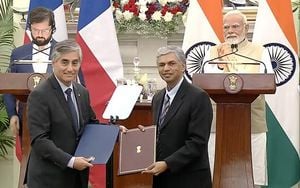In a significant political shift, Germany's new government, led by Chancellor Friedrich Merz, convened for its first cabinet meeting on the evening of May 6, 2025. The meeting took place at the Chancellery in Berlin, marking a fresh start for the coalition after a tumultuous election period.
Chancellor Merz, who is 69 years old and previously worked for the asset management firm BlackRock, hosted the meeting with an unusual gesture: he provided his ministers with beer from a ten-liter keg. "It won’t be a drinking session out of frustration over the failed first ballot," Merz assured in an interview with RTL, emphasizing the importance of unity and collaboration as the new administration embarks on its work.
The new government is a coalition formed between the Christian Democratic Union (CDU) and the Social Democratic Party (SPD), boasting a total of eight female ministers and nine male ministers. This marks a notable representation of women in leadership roles, a change that many hope will influence policy decisions positively.
Among the key figures in the cabinet, Thorsten Frei, 51, takes on the role of Head of the Federal Chancellery. Frei, a seasoned parliamentarian and close ally of Merz, is expected to play a crucial role in the administration. Johann Wadephul, 62, has been appointed as the new Foreign Minister, bringing a transatlantic perspective to Germany's foreign policy.
In the economic sector, Katherina Reiche, 51, has been appointed as the Federal Minister for Economy and Energy. Reiche, who has prior experience in the energy sector, particularly with E.ON, is expected to drive forward Germany’s economic recovery and energy transition efforts. Meanwhile, Karsten Wildberger, 56, an independent figure and former CEO of Ceconomy, will oversee the newly established Ministry for Digitalization and State Modernization.
Nina Warken, 45, takes the helm as the Federal Minister for Health, while Patrick Schnieder, 57, has been appointed as the Federal Minister for Transport. Both ministers are expected to address key issues in their respective areas, especially in light of the ongoing challenges posed by the COVID-19 pandemic and infrastructure needs.
Education and family policies are under the guidance of Karin Prien, 59, who leads the expanded Ministry for Education, Family, Seniors, Women, and Youth. Prien's experience as the former Education Minister of Schleswig-Holstein positions her well to tackle educational reforms and family support initiatives.
On the security front, Alexander Dobrindt, 54, has been appointed as the Federal Minister of the Interior. Dobrindt, who previously served as the head of the CSU parliamentary group, will focus on internal security and migration policies. Alois Rainer, 60, will oversee the Federal Ministry for Agriculture, Food, and Home Affairs, bringing his background as a butcher and parliamentarian to the role.
In a move to emphasize environmental concerns, Carsten Schneider, who previously served as the East Commissioner, has transitioned to the role of Minister for the Environment. His experience is expected to guide Germany's environmental policies as the country navigates climate change challenges.
Stefanie Hubig, 56, has taken over as the new Minister of Justice. Hubig, an experienced legal professional, was previously the Minister of Education in Rhineland-Palatinate. Her appointment is seen as crucial in reforming the justice system.
Verena Hubertz, 36, has been appointed as the Minister for Housing, Urban Development, and Construction, while Reem Alabali-Radovan, 35, will lead the Ministry for Economic Cooperation and Development. Alabali-Radovan's previous role as the Commissioner for Migration, Refugees, and Integration positions her well to address Germany's international development commitments.
As the government settles into its roles, the emphasis on collaboration and shared goals will be essential for navigating the complexities of contemporary governance. The cabinet is tasked with addressing pressing issues such as economic recovery post-pandemic, climate change, and social integration.
Elisabeth Kaiser, a notable figure from Thuringia, has been appointed as the new East Commissioner, succeeding Schneider in the role. This appointment underscores the government’s commitment to addressing the unique challenges faced by Eastern Germany. Kaiser’s background in regional politics is expected to bring a fresh perspective to the cabinet.
The coalition's structure reflects a blend of experience and new leadership, aiming to appeal to a broad spectrum of the electorate. The SPD's Lars Klingbeil, 47, has taken on the roles of Vice-Chancellor and Finance Minister, positioning him as a central figure in the coalition's economic strategy.
As the new government embarks on its journey, the initial cabinet meeting symbolized a hopeful beginning, with Merz’s lighthearted approach setting a tone of camaraderie amidst the challenges ahead. The coalition's ability to work together effectively will be closely watched as they address the pressing needs of the German populace.
In conclusion, the new German government, with its diverse cabinet and ambitious agenda, marks a pivotal moment in the nation's political landscape. The focus now shifts to how these leaders will implement their policies and respond to the expectations of their constituents.




